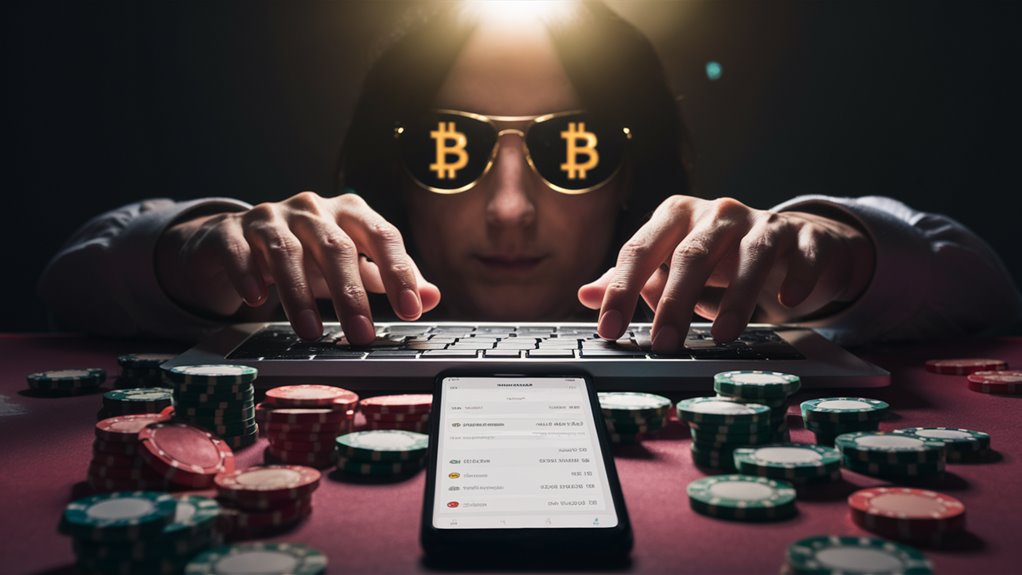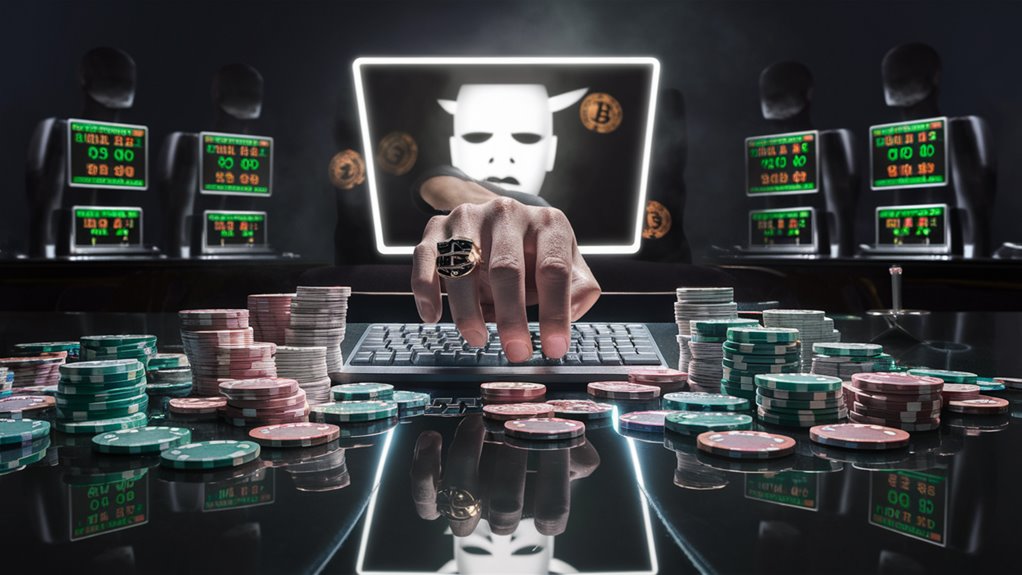So, you’re curious about cryptocurrency gambling? Well, let’s break down what makes it so different from your regular online casino experience. Think about the last time you signed up for a betting site – all those forms to fill out, ID documents to upload, and bank details to share. Pretty tedious, right?
Crypto gambling flips this whole process on its head. Instead of handing over your personal information, you’re basically stepping into a digital casino wearing an invisible cloak. All you need is your crypto wallet address, which works kind of like a secret code that lets you place bets without revealing who you are.
You know how blockchain technology can seem complicated? In gambling, it actually makes things surprisingly straightforward. Picture dropping some chips on a poker table, but instead of physical chips, you’re using digital tokens that can’t be traced back to you. Pretty neat, right?
But here’s the thing – this anonymity is both a blessing and a challenge. Sure, it’s great not having to share your personal details with every gambling site you visit. But it also brings up some important questions we need to think about. Like, how do we make sure everyone’s playing fair? What happens if something goes wrong? And most importantly, how do we protect people who might struggle with gambling addiction when they can bet almost invisibly?
The future of digital betting is definitely being shaped by these questions, and honestly, we’re still figuring out the best ways to balance privacy with protection. It’s kind of like we’re all learning the rules of a brand new game together.
Privacy Advantages in Crypto Gambling

Let’s talk about why privacy is such a big deal in crypto gambling. You know how uncomfortable it can be sharing your personal financial details online, right?
Well, that’s where cryptocurrency gambling really shines. Instead of handing over your credit card or bank information, you simply use your crypto wallet address – it’s that simple.
Think of it like wearing a mask at a casino. Sure, everyone can see you’re playing, but they don’t know who you are. That’s basically how blockchain technology works in 먹튀검증 보증업체 순위 crypto gambling.
Your transactions are visible, but they’re not connected to your real identity. Pretty neat, huh? This means you can keep your gambling activities separate from your day-to-day finances, without worrying about nosy people or unfair judgment.
You might be concerned about cybersecurity, and honestly, who isn’t these days? The beauty of crypto gambling is that there’s very little personal information at stake.
Even if a gambling site gets hacked, there’s not much for criminals to steal. No credit card numbers, no bank details, nothing that could lead to identity theft.
Plus, crypto transactions are like one-way streets – once they’re done, they’re done. No chargebacks, no disputes, just straightforward dealings that put you in control of your money.
Remember those bank statements that show every single transaction? Well, with crypto gambling, you won’t have to worry about explaining your hobby to anyone.
It’s just between you and your crypto wallet, keeping your entertainment choices private and secure, just as they should be.
Regulatory Challenges and Legal Implications

Let’s talk about the tricky world of crypto gambling regulations. You know how navigating traditional gambling laws can be confusing? Well, throw cryptocurrencies into the mix, and things get even more complicated.
Think of it like trying to follow a recipe that’s still being written. Most countries haven’t quite figured out how to handle crypto gambling yet, which leaves everyone – from casino operators to players like you – scratching their heads about what’s allowed and what isn’t.
The really interesting part is how different countries are handling this challenge. Some places have completely shut the door on crypto gambling, while others are trying to make it work with strict rules.
It’s kind of like how some parents ban video games entirely, while others set up careful guidelines and time limits.
One big headache for platforms is dealing with KYC and AML requirements. Picture trying to maintain a secret identity while also having to show your ID at the door. That’s basically what crypto gambling sites are dealing with right now.
They’re stuck between keeping users happy with privacy and staying on the right side of the law.
And if you’re thinking about trying crypto gambling yourself, there’s some stuff you should know. The legal risks can be pretty serious in places where it’s not allowed, and dealing with taxes? Well, that’s a whole other puzzle to solve.
Plus, if something goes wrong with a gambling platform, getting help isn’t as straightforward as calling customer service at your local bank.
What makes this even trickier is that different countries keep changing their minds about how to handle crypto gambling. It’s like trying to play a game where the rules keep changing while you’re playing.
Smart players stay informed and keep an eye on their local regulations, because what’s okay today mightn’t be tomorrow.
Security Risks and Fraud Prevention

Let’s talk about staying safe in the world of crypto gambling, because security threats can pop up when you least expect them.
You know how hackers and scammers are always getting more creative? Well, protecting your digital money requires some smart thinking and careful planning.
First things first, think of your crypto wallet like a digital vault. You’ll want to lock it down tight with strong security measures, such as two-factor authentication and secure passwords.
Remember, once someone transfers your 도박사이트 사기 유형 알아보기 crypto, there’s no calling the bank to reverse it – it’s gone for good.
Here’s a practical tip: keep your gambling money separate from your main crypto stash. It’s kind of like having a separate wallet for your night out – if something goes wrong, at least your main funds are safe.
Consider getting a hardware wallet for your long-term savings, while using a different wallet for your gambling activities.
Watch out for red flags when choosing gambling platforms. If a site looks too good to be true or promises impossible returns, trust your gut – it probably isn’t legitimate.
Take a few minutes to check their licenses, read what other users are saying, and verify their security certificates. Stick to well-known platforms that use provably fair games and have clear security measures in place.
Scammers love to set up fake gambling sites or rig games to steal your crypto. They might even try phishing attacks, sending emails that look legitimate but are designed to grab your wallet credentials.
Stay alert and never share your private keys with anyone, no matter how convincing they might seem.
Impact on Problem Gambling

Let’s talk about how cryptocurrency gambling creates some unique challenges when it comes to problem gambling. You know how regular casinos have systems in place to spot addiction? Well, crypto gambling changes all that because it’s incredibly easy to keep your activities hidden from loved ones and financial institutions.
Think about it this way – when you’re gambling with crypto, there’s no paper trail like you’d get with credit cards or bank statements. While this might sound great for privacy, it actually makes it super tough for anyone to notice if you’re developing a gambling problem.
It’s kind of like having an invisible spending habit that flies under everyone’s radar.
The really tricky part is that crypto gambling sites often don’t have the safety nets you’d find at traditional casinos. Want to get around betting limits? Just create a new digital wallet. Need to bypass self-exclusion programs? Same deal.
There’s no waiting period for transactions either – everything happens instantly, which can be dangerous if you’re trying to control impulse betting.
Here’s what makes recovery particularly challenging: support services and counselors can’t help what they can’t see. Traditional warning signs, like mounting gambling debts on credit reports or suspicious banking patterns, simply don’t exist in the crypto world.
So if someone’s struggling with addiction, they might keep diving deeper without triggering any of the usual red flags that would normally alert family members or treatment providers.
It’s like trying to help someone find their way out of a maze while blindfolded – you can’t guide them if you don’t know where they are.
Future of Anonymous Betting Platforms

Let’s talk about what’s on the horizon for anonymous betting platforms. You know how privacy is a big deal these days, right? Well, these platforms are right in the middle of some pretty interesting changes, especially as governments try to figure out how to handle them.
Think of it like this: on one side, you’ve got people who want their privacy when placing bets, and on the other, you’ve got regulators trying to stop things like money laundering.
It’s kind of like trying to find the sweet spot between keeping your diary private and letting your parents know you’re not getting into trouble.
The tech side of things is where it gets really interesting. Have you heard about DeFi? These new decentralized systems are popping up everywhere, and they’re bringing some clever ways to keep things anonymous.
Plus, there’s this thing called zero-knowledge proofs, which is basically like proving you’re old enough to drive without actually showing your ID.
Some betting platforms will probably split into two camps. You’ll have your totally anonymous ones operating in countries with relaxed rules, kind of like those offshore accounts we hear about.
Then there’ll be the more regulated ones that might let you stay anonymous for small bets but need to know who you’re for the big stuff.
It’s similar to how some stores don’t ask for ID when you buy something small, but they definitely want to know who you’re when you’re making a major purchase.
The really cool part? As blockchain technology keeps getting better, we’ll likely see some creative new solutions.
Maybe something that lets you keep your privacy while still playing by the rules. The future’s looking pretty interesting for betting platforms, and they’re definitely going to need to get creative to keep everyone happy.
Common Questions
How Do Cryptocurrency Gambling Winnings Affect Personal Tax Reporting Requirements?
Let’s talk about cryptocurrency gambling and taxes, because this is something that often catches people off guard. You know how regular gambling winnings need to be reported to the IRS? Well, the same rules apply when you’re winning with crypto.
Think of it this way: whether you hit the jackpot with Bitcoin or score big with Ethereum, the IRS wants to know about it. Every single win counts, no matter how small. It’s kind of like keeping track of your regular casino winnings, but with a digital twist.
The tricky part is that you’ll need to keep detailed records of your crypto gambling activities. This means noting down when you won, how much you won, and what the cryptocurrency was worth at the time of your win. Sure, it might seem like a hassle, but trust me, it’s way better than dealing with tax problems down the road.
Remember those times you won $50 at a slot machine and wondered if you needed to report it? The same principle applies here. Even small crypto wins need to be declared on your tax return. The IRS considers all gambling winnings as taxable income, whether they’re in dollars, Bitcoin, or any other cryptocurrency.
Can Traditional Gambling Loyalty Programs Be Integrated With Anonymous Crypto Casinos?
Let’s be honest, mixing traditional loyalty programs with anonymous crypto casinos is quite a head-scratcher. Think about it for a second – traditional loyalty programs need to know who you are, where you live, and probably your favorite color too. But the whole point of crypto gambling is staying under the radar, right?
It’s kind of like trying to wear a name tag at a masquerade ball. The two ideas just don’t play well together. Traditional casino rewards track your gaming habits, spending patterns, and personal details to give you those sweet perks and bonuses. Meanwhile, crypto casinos thrive on keeping things mysterious and private.
You might think there’s a workaround, but here’s the catch: the moment you start collecting points or earning tier status, you’d need to verify your identity. That basically throws the whole anonymity aspect out the window. Sure, some crypto casinos offer reward systems, but they’re usually simplified versions that work with wallet addresses rather than personal information.
What Happens to Crypto Bets if a Gambling Platform Suddenly Closes?
Let’s face it, crypto gambling can be risky, and platform closures are a real concern that many players don’t think about until it’s too late. You know how it goes – everything seems fine one day, and then suddenly, poof! The platform disappears, often taking your hard-earned crypto with it.
Think of it like leaving your money at a regular casino’s cage overnight. Sure, it might be convenient, but what if the casino locks its doors and never opens again? That’s why the golden rule in crypto gambling is pretty straightforward: keep your funds moving. Don’t let your winnings sit in the platform’s wallet any longer than necessary.
Smart players make it a habit to withdraw their funds regularly, ideally after each significant win. And here’s another crucial tip: stick to platforms that have proven their reliability. Look for gambling sites that hold proper licenses and have a solid track record in the crypto gambling community.
Do Anonymous Crypto Gambling Platforms Offer Provably Fair Gaming Certification?
Let’s talk about anonymous crypto gambling platforms and their claims of provably fair gaming. You know how there’s always that lingering question about whether online games are truly random? Well, many crypto gambling sites now offer what they call “provably fair certification” – a fancy way of saying you can actually check if the games are legitimate.
Think of it like having a virtual referee that uses blockchain technology to make sure nobody’s tampering with the results. Pretty cool, right? But here’s the thing: while lots of these platforms talk a big game about being transparent and verifiable, you shouldn’t just take their word for it.
Before you dive in and start betting your crypto, take some time to do your homework. Check out independent reviews, verify their certification claims, and maybe even test the verification system yourself with small bets first. It’s kind of like trying a new restaurant – you might want to sample an appetizer before ordering the expensive main course.
Can Players Recover Their Accounts if They Lose Their Crypto Wallet Credentials?
Let’s be honest about something that might seem scary: losing your crypto wallet credentials is a really big deal. Unlike traditional bank accounts where you can just show your ID and reset your password, crypto wallets work differently. Think of it like losing the only key to a super-secure vault – once it’s gone, there’s no spare hidden under the doormat.
Here’s the tough reality: if you lose access to your crypto wallet credentials, you generally can’t recover your account. This happens because these platforms are built on the principle of complete anonymity and decentralization. They don’t keep copies of your information or store backup codes somewhere, which is actually part of what makes them secure in the first place.
You know how your email provider can help reset your password if you get locked out? Well, crypto platforms intentionally don’t offer this kind of safety net. It’s a bit like having a secret diary with no copies – if you lose it, those memories are gone forever. That’s why crypto experts always stress the importance of keeping your credentials super safe, maybe even writing them down and storing them in multiple secure locations.
